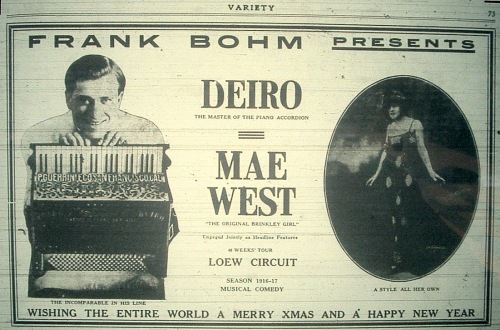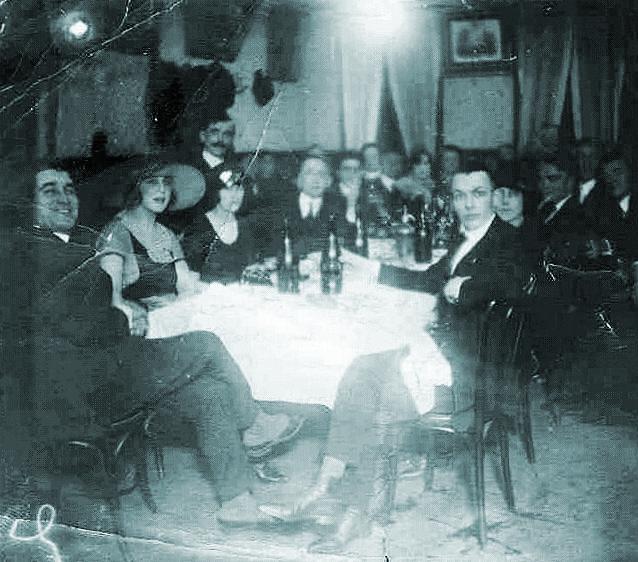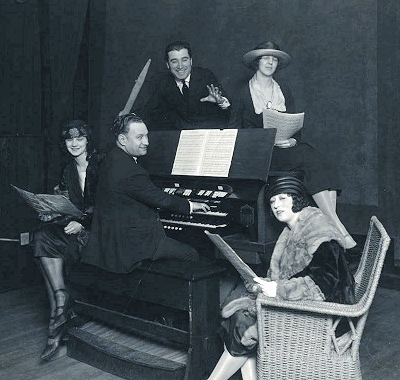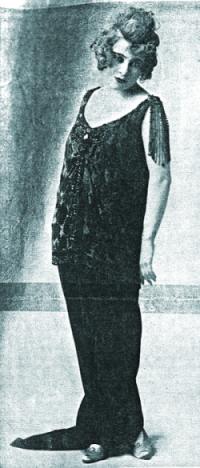Mae West (1893-1980) was an American legend: movie star, cultural icon, celebrity, comedienne, feminist, sex goddess, wit, vaudevillian, writer, entertainer, businesswoman, impresario. Mae was extremely attractive and well-endowed -- beautiful women have always played an important and inspirational part in Guido's artistic life -- and, at the peak of her popularity, sailors were inspired to name their inflatable life jackets after her monumental 43-inch "assets." She was in all respects a woman ahead of her time, due -- in no small measure -- to Guido Deiro.
Guido and Mae met for the first time when they both performed at a vaudeville show in Detroit during August 1913. Guido commanded top billing and was praised in review after review as an accordionist of exceptional ability. Because Guido was a headliner -- Mae was only playing secondary roles at the time -- she hoped that Guido would give a big boost to her career. However, her attraction to him was not entirely for professional reasons; she was completely infatuated with him.
Mae, who had remained detached from previous lovers, was consumed by Guido. She found him exciting, passionate, and indulgent. Guido bought Mae a beautiful diamond ring within a week of their first meeting. He said, "This ring is not a family jewel -- it cost me real money. Please wear it." Mae wore it proudly.
Mae confessed that she fell passionately for the charming accordionist; for the first time she was in love. She wrote, "I couldn't help myself -- [Guido] was an amazing lover. The sex thing was terrific with this guy. I wanted to do it [with Guido] morning, noon and night, and that's all I wanted to do."
For the first time, physical desire met its match in emotional intensity. This affair went "very deep, hittin' on all the emotions. You can't get too hot over anybody unless there's somethin' that goes along with the sex act, can you?"
Guido was powerfully built, with heavily muscled shoulders and bulging biceps. His big hands gave him an octave and a half reach on the accordion. He had bold features, large eyes, wavy black hair and a sensuous nature that projected across the footlights. Mae might easily have coined her "tall, dark 'n' handsome" to describe him. He had everything she demanded in a lover.
Guido was equally infatuated with Mae and arranged to be booked with her the following week in Rochester, New York. Over the next two seasons, Mae and Guido attempted to be together as much as possible. At first bookings were difficult to schedule. When Guido's agent could not book them together, Guido canceled his own bookings to travel with Mae. He decided that he would rather be with her even if it meant accepting a less prestigious and lower-paying position as the conductor for the theater pit orchestras during her performances. Mae appreciated Guido's musical abilities and used to ask her audiences, "How do you like my leader?" Guido always got a big hand.
Guido proved not only an exciting lover to Mae, but also a springboard to increased stature in vaudeville. Things improved even more when he had his new contract specify joint bookings with Mae; he could then be with her and also continue his high-paying work as a headliner accordionist. Mae even made a pledge that she would not appear on the stage without him.
Following are two newspaper articles about their romance:
Columbus Ledger- March 19, 1914
Deiro, the young Italian at Keith's this week, is the inventor of the
particular style of piano-accordion he is playing. It is manufactured in
San Francisco, he says, from a plan he drew while still in Rome. He says
that the instrument covers five octaves and has twice the tone compass
of a piano. He expects to retire from the stage as soon as he makes
enough money to finance a plant for the manufacture of his invention-
and incidentally to get married. And to guess whom? To Mae West.
Remember the short haired comedienne who appeared at Keith's the week
Eva Tanguay was performing at the Southern? If memory serve, Miss West
introduced Deiro, who was visiting here that week, as her fiance , "Count Guido," Guido being his first name. It is
refreshing to find that "he ain't no such animal."
He was the most popular act at Keith's this week.
Editor's Note: This is the first recorded mention of Guido's nobility.
Columbus Journal- March 20, 1914
"Love laughs at locksmiths" and Cupid takes long chances, even in
vaudeville, but Deiro, the accordeon player now at Keith's, put him
through very hard paces yesterday. Deiro braved the wrath of those who
might oppose him and secretly skipped off to Cincinnati Thursday morning
in order to see his fiance , Mae West, who is playing at the Keith
house in that city. He left at 1:05 a.m. and got back at 3:10 p.m., just in
the nick of time to go on for his last act.... He played his accordeon
as he had never played it before, for he had the inspiration.
Throughout 1914 and into the early part of the next year Mae West and Guido traveled together and appeared all over the country on the same vaudeville stages. More often than not, although crowds enjoyed her act, he (Deiro) was singled out as the hit of the evening. In Texas, at San Antonio's Majestic, he took top honors for his temperamental and talented display, and Mae West, "the Eva Tanguay of vaudeville," was listed offhandedly among "six other acts."
Click Here (201 KB) to see advertisement and review of Majestic theater show in which Guido Deiro and Mae West (dainty, refined comedienne) share the bill. Notice how much space is devoted to Guido and Mae respectively. Scrapbook 1, page 34.
In New York at the American Roof, Deiro scored "the applause hit in the first half," while Mae West was placed "next to closing, a position Deiro should have had." At Chicago's Palace, when their romance was young, Deiro "came near stopping the show, while Mae West, despite "spots of fun, lets down."
After they split up as a couple, Deiro went back to the major-league Keith circuit and signed with top agent Max Hart, while Mae had to settle for the relative obscurity of the Western Vaudeville circuit, based in Chicago. She appeared in such venues as Peoria and Des Moines, as well as Chicago itself.
The December 25, 1914 issue of Variety (page 73) contained a half-page advertisement for Guido -- "The Master of the Piano Accordion, The Incomparable in His Line," and Mae -- " The Original Brinkley Girl, A Style All Her Own," who were "Engaged Jointly as Headline Features."

Guido proposed many times to her and she finally agreed to marry him (perhaps as early as late 1913, or perhaps not until the Summer of 1914 after his divorce from Julia Tatro was finalized) under the stipulation that the marriage be kept a secret. Guido took Mae to meet his family members in Washington and, despite his promise, confided to them that the two were, indeed, married. One young girl who met Guido's bride at a family gathering in Cle Elum remarked decades later, "She had the largest breasts I had ever seen."
Although their marriage was supposed to be a secret, their business associates guessed the truth, especially when Variety magazine printed a notice stating that "Mr. and Mrs. Deiro" (i.e. Guido and Mae together, as an act) were playing at Shea's in Toronto, Canada, for the week beginning November 29th, 1913. Other sources also confirm their engagement and marriage.
Mae herself was quoted in one newspaper of the day referring to Guido as "her fiancee." During an NBC national radio broadcast in 1946, Walter Winchell stated emphatically,
"It wasn't Pietro, but his brother Guido, who was married to Mae West." Joe Laurie, Jr., the author of the 1953 book, Vaudeville -- the definitive work on Vaudeville -- referred to Guido Deiro as "Mae West's hubby." Nils Granlund, a publicist for the Loew circuit, wrote in his memoirs that Mae West and Deiro got married.
Between July 1914 and February 1915, Mae and Guido appeared on the same bill in theaters throughout the Loew Circuit. Mae worked the accordion into her act, pretending to play as Guido stood in the wings supplying the real music.
See End Note
Although some later remembered that they both carried on other affairs, Mae insisted that, for the first time in her life, she felt jealous.
While on the road in Hamilton, Ontario, Mae contracted the flu and Guido helped nurse her back to health. She wrote, "I spent the entire week in bed. . . [Guido] D. used to sit by my side and curl my hair with iron curlers while I was in bed. I loved being rubbed with cocoa oil after a hot bath. I used it every night. Once [Guido] D. brought cocoa butter by mistake and I smelled like a jungle monkey colony for weeks." She continued, "[Later,] In Newark, New Jersey, every night I was late coming home. Generally, it was about three o'clock in the morning when I opened my door. [Guido] D. would lie in bed with his door open, and listen for the elevator to stop on that landing."

Guido and Mae holding hands at a dinner party
|
End Note: Anthony Galla-Rini (b. 1904) saw Guido and Mae perform in 1915. He said, "There was much going on in New York and the Galla-Rini Four took the chance to go to the show at Loew's 42nd Street Theatre, where Guido Deiro was then performing. Mae West was on the same program, doing her own act and appearing in very flimsy attire. Guido came on first and one of his selections was Tesoro Mio Waltz (Becucci). Mae West followed and at the end of her act she did an encore by walking on with a dummy accordion (nothing but air in it) and, waving the bellows in and out, she gives an imitation with Guido playing the waltz offstage. After the waltz was played, Guido would poke his head out so that the audience could see him with his own accordion on.
"Guido was quite a showman and also quite a ladies man. His appearance on stage was always very elegant. One trick he learned was to eat a piece of hard, sweet candy before going on stage. Then, when he smiled, his teeth would really glisten. Guido was very well paid. He earned as much as $600.00 a week in vaudeville."
Anthony Galla-Rini: On His Life and the Accordion, Ove Hahn (Stockholm, Nils Flacke Musik: 1986), 29, 31.



